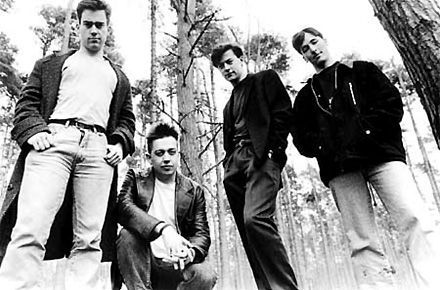Over their twenty-two year history Dayglo Fishermen songs have always embraced the rich spectrum of human emotions and moods, from the depths of despair to drug-enhanced ecstasy. Most of the band's albums feature a mix of emotions, taking the listener on an undulating ride of highs and lows as the tracks are played. But one album rejects that pattern completely. It stays low - very low. It plummets to the depths of negativity and stays there. It can only be described as one of the most melancholic musical experiments in depression, gloom, futility and anger ever undertaken.
That album is 'Magic Organ'.
 |
| Dayglo Fishermen 1992 - The 'Magic Organ' line up Peter Fothergill, Sean Wills, Richard Burton, Eamonn Maddick |
 |
| Magic Organ - Album Cover: Front |
The first track, ominously name 'Silent Scream', opens the album with a frantic tirade of harsh drums, bass and guitar which immediately implants a sensation of mild insanity in the listener. The lyrics, which are probably the tamest on the album, nevertheless invoke a sense of dread when blended with the music. Lines such as "You parade your morals on a new stage, like a bomb, on a bed of nails, like a bomb" jar intentionally with the fast and oddly timed bass line and hard percussion. With fast flanged guitar underpinning everything, even the most positive frame of mind quickly develops a feeling of anxiety, which sets the listener up perfectly to gain the maximum effect from what's to come.
The first two lines of the second track, "Explosion of colour. Bright lights", accompanied by a sampled string section, seem positive enough, but the hope they instill soon becomes false. Titled 'Hate', the song soon reveals that the colour and lights are not something pleasant but something "Intense and disturbing, the promise of fear". The distant, distorted and heavily delayed guitar that is a constant companion throughout the song builds a sense of menace right up to the choruses, which all end with the ominous line "A hand that strokes your face, and delivers hate". The second verse continues to drag down the the listener's mood with lyrics describing a dark and disturbing prison and mental weakness. The occasional moaning backing vocals, performed by guest artist Josephine Brown, fortify the gloom perfectly. The final verse finishes with the line "A sad delusion fills your mind", leaving the listener drenched with confusion and doubt.
Of all the tracks on 'Magic Organ', 'Hate' has the mildest and most accessible music, which is probably why it's the only track from the album to feature on the band's later compilation releases, 'Keep to the Path' in 1993 and 'Dayglo Pizza' in 2000.
 |
| Magic Organ - Album Cover: Inside |
The sustained and increasingly distorted synthesiser note that introduces the next track, 'Holy Back Beat' raises the tension to a new high as the drums kick in once again. By now the listener is expecting the worst, but then what is probably one of Dayglo Fishermen's finest bass guitar riffs begins. It's completely disarming, giving the song a deep and epic feel, and the listener's frame of mind is turned ever so slightly towards the positive. And then the vocals start to reveal the story of a woman, swinging from sanity to insanity, desperate to find solace in religious devotion. She fails. The disturbing tone of the album is restored.
'Dead Love' begins abruptly with a remarkably straightforward drum and bass line, leading quickly into a long and plodding first verse. Lines such as "I can't describe the aching inside, and when this feeling comes communication dies" sets things up nicely for the eventual chorus, which begins with "Stay with me in the rain, with cold dark memories". Complementing the miserable lyrics of the lead vocals, Josephine Brown returns to provide the backing vocals claiming "It's all the same" over and over and over and over again. The percussion-free mid-section, with the guitar wailing like a suicidal whale, is actually a welcome break from the relentless and rigid drum and bass that had preceded it. But the relief is short-lived. The chorus is soon back. Finally the song reaches it's climax, with the guitar building nicely to end the song on a noticeably more positive note than it began. Could things be looking up?
Not really.
The final track, 'Deep Down', starts well enough with an 80s style keyboard riff. But that only lasts for one bar. Soon the first verse reveals a bitter and obsessed soul, betrayed and in utter confusion as to why he is that way. The chorus, with it's aggressive strummed guitar, illustrates the depth of his obsession, and very quickly reveals the potential reason for his condition as he almost shouts "I've taken too much to give it up". The song ends with him shouting "Give it up!". Perhaps he should.
Of course, there are other examples of depressing songs on Dayglo Fishermen's albums, but they are quirks on otherwise upbeat works. For what is probably the most extreme example listen to the grim and utter hopelessness spoken of by Eamonn Maddick during the closing two minutes of 'Tone G', featured on the 1991 album 'Fresh Gin'. That takes some beating, by anyone's standards.
'Magic Organ' remains a unique example within the band's catalogue of albums. It should br approached with caution, but also praised for it's faultless consistency of vision. Well worth the risk, if you're up for it.

Good write-up.
ReplyDeleteI think the orchestral break on Deep Down is the only true glimpse of beauty on the album, but it's fleeting and tinged with melancholy, then the reverie is ripped apart by the chorus followed by Richard's scratchy anti-solo.
Sean